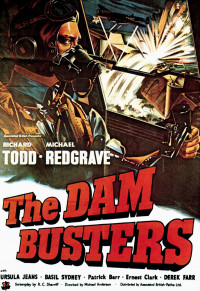



Today, we offer Jeff Godsil on Mysterious Island, Matthew of KBOO's Gremlin Time on The Dam Busters, and in the book corner a new account of the making and meaning of The Great Escape.
––––––––––––––––––––––––––––––––––––––––––––––––––––
The Great Escape for Friday, Feb 18, 2022
Few great movies come with no baggage.
Take The Godfather. The movie does not exist in a vacuum. First there was the Mario Puzo novel, but before that, there were real stories about certain Mafiosi. Then there was the production history, a tale itself now about to be turned into a TV mini-series, and which is a part of the film’s lengthy afterlife, which includes sequels, parodies, Mafia knock off films, books about The Godfather, and the role of the film in the culture, especially some of its lines of dialogue.
That’s just one film among thousands, if not more. It seems as if no movie doesn’t have a “making of” book in it. The latest and one of the best is Dreams of Flight: The Great Escape in American Film and Culture, by Dana Polan, from the University of California Press. Mr. Polan professes film at NYU, and had already written books on the Lego movie, the history of film studies in the United States, and two volumes in the BFI series, In a Lonely Place, and Pulp Fiction.
Dreams of Flight comes across as a BFI monograph, but three times as long and four times as detailed.
Here’s the rundown:
- The original incident, the first accounts, and the life of Paul Brickhill and the book he published in 1950. Brickhill was an Australian journalist turned pilot and was a prisoner in Stalag Luft 3, or Air Force prison camp three. He also wrote The Dam Busters, itself also turned into a semi-cult film, but ended up living in an apartment tower bitter about life. There are two biographies of him.
- Early adaptations, one for American TV, and a 26-part series for Australian radio, produced by Morris West. The hour long life television adaptation sounds interesting, given the creative solutions the producers found to create a barracks, a tunnel and a grounds all on one set. Brickhill narrated the radio version, which featured Rod Taylor among others.
- The film’s making. Professor Polan goes on to recount where and how the film was shot, cast, written, and staged, with some special attention to the under-valued career of John Sturges. Director Sturges had wanted to make an adaptation since reading about the escape, possibly in True magazine. He couldn’t get the rights to the book until he had a hit with The Magnificent Seven, made for the Mirisch Company, which also produced a string of Billy Wilder masterpieces.
- The bulk of the book is a close reading of the film, including byways into other POW films, gender issues, and the post-war fascination with Nazis, a la Susan Sontag.
- Finally, there is the film’s afterlife. These include a TV movie that tells the rest of the story, the TV show Hogan’s Heroes, which one of the former POWs preferred to the original film, and a section of an Eddie Izzard stand up routine about the The Great Escape. In the TV movie, we learn what happened after the end of the war, wherein the Unite States tracked down and arrested or killed the German camp soldiers who executed the randomly selected 50 escapees. Professor Polan has let no tuft of earth go unturned. He even tracks down the indie film The Tao of Steve to further analyses the cult of cool that still clings to star Steve McQueen. The film is like a tunnel, it inveigles its way into all media platforms, commercials, stand-up, other movies, video games, print ads, and more.
Even the endnotes are fascinating, and a must read. There are the usual quote citations, but also lengthy additional material that can go on for a page or more. For those who like to go down to the molecular level, there is even more fascinating material here as in the main text.
Surprisingly, we learn that ultimately The Great Escape is something of a downbeat film, not unlike Billy Wilder’s Stalag 17. For one thing there are numerous bad events in the course of the film, and the results of escape itself provokes the James Garner character to ask at the end, "was it worth it?” He receives an equivocating answer. I just the film can be interpreted as both antiwar and exemplary of bravery during war.
Professor Polan also explores The Great Escape and other POW films in the context of prison as a metaphor for life or existential crisis. Here is a relevant excerpt, which shows the range of his references:
Excerpt from the book, pages 129-131.
Dreams of Flight makes a fine companion to Geoff Dyer’s great book on Where Eagles Dare, which we talked about last year.
- KBOO



